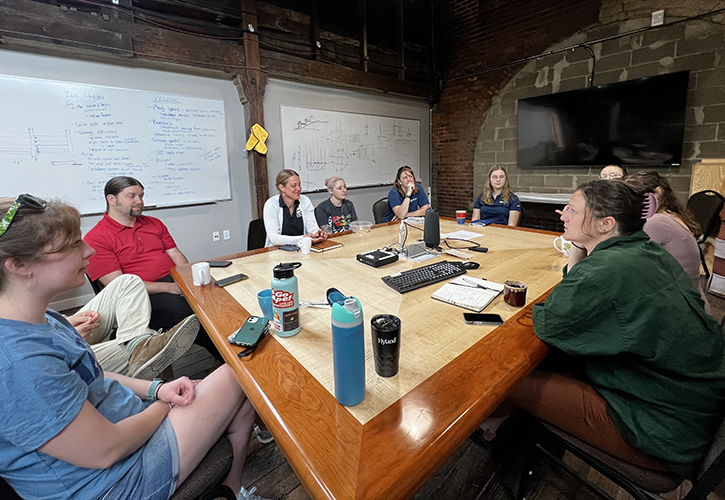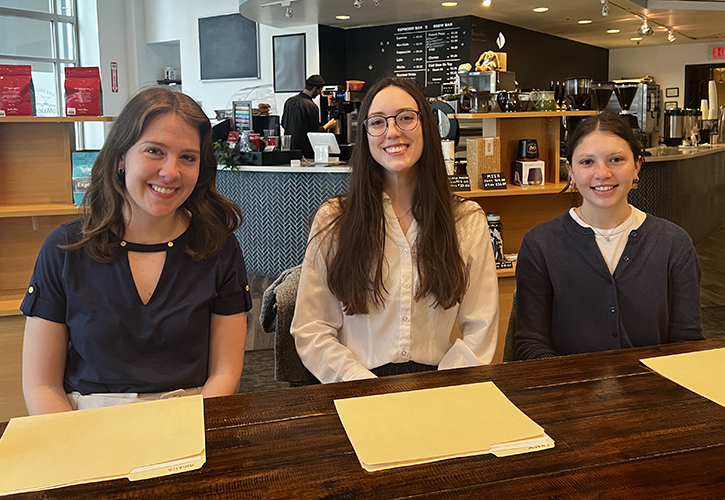College of Arts and Sciences Newsroom

Hanley Sustainability Institute partners with city for internships
By Dave Larsen
Three University of Dayton students got first-hand experience this summer as sustainability professionals for the City of Dayton through a new initiative of UD’s Hanley Sustainability Institute.
The Undergraduate Sustainability Fellows program provides sustainability majors or students with a proven interest in sustainability with paid, full-time internship opportunities at partner organizations.
Eleanor Yates-McEwan and Amelia Dougherty worked in the city’s Office of Sustainability. Yates-McEwan, a junior philosophy and urban sustainability major from Centerville, Ohio, served as a policy and project management fellow. Dougherty, a junior sustainability major with energy concentration from Pittsburgh, was an energy analyst fellow.
Emme Gerth, a senior sustainability major with urban concentration from Cincinnati, was the environmental educator for the city’s Dayton Sprouts program, an 8-week sustainability summer camp that teaches sustainability topics including gardening, composting, waste and energy to more than 300 children ages 6-12 at Dayton recreation centers.
“I wanted to give students the opportunity to work for some organizations that really see the sustainability challenges on a large scale,” said Sarah Richard ’19, the Hanley Sustainability Institute’s student engagement coordinator. “Being able to work for a city office gives you a high-level perspective, which is not always an opportunity for undergrads to experience.”

Yates-McEwan and Dougherty worked under the supervision of Meg Maloney ’18, who holds a bachelor’s degree in environmental biology and a master’s degree in environmental science from UD. Maloney was promoted to city sustainability manager in June. In 2021, Maloney and Richard wrote a proposal that resulted in a $50,000 grant for the Sprouts program from the U.S. Conference of Mayors.
“Meg has a demonstrated record of protecting the environment while bringing fiscal benefits to city operations,” said Shelley Dickstein, Dayton city manager. “We are happy to know that her success in sustainability work will continue to benefit the City of Dayton and our residential and business communities.”
Yates-McEwan balanced several projects during her fellowship, including researching and crafting recommendations for a forthcoming update of Dayton’s sustainability strategy, endorsed by the Dayton City Commission in August 2020. She also developed a proposal for a sustainable purchasing policy.
Dougherty crafted a preliminary decarbonization plan for the city, which involved studying similar plans from other Ohio cities and her native Pittsburgh, as well as analyzing Dayton’s 2019 greenhouse gas inventory.
“This experience has helped me define my interests in the field and it has confirmed that I’m in the right place,” said Dougherty, who entered the University as a civil engineering major before discovering Hanley Sustainability Institute, and pursuing a minor in Environmental Engineering. “I am confident in my future, with where I’m going. It’s an exciting first step.”
Gerth taught three one-hour classes daily, four days a week, at the Greater Dayton, Northwest and Lohrey recreation centers. Her lessons covered environmental education, food literacy and outdoor engagement.
“The fellowship has helped me to take information that I am learning in my classes on environmental systems and processes and turn it into a more digestible format for youth and the greater Dayton community,” Gerth said. “It also has given me an opportunity to put a more positive and uplifting spin on some of the climate situations that are occurring right now, because when working with youth there is a lot of passion, motivation and positivity.”
On Fridays, the students met with Richard at the institute’s offices in Fitz Hall to cover leadership objectives and actively reflect on their internship experiences. They also participated in field trips and extracurricular activities, including a behind-the-scenes tour of the Cincinnati Zoo by Sustainability Director Stephenie Ritchey ’12, who holds a master’s degree in renewable and clean energy from UD.
The students also visited Rumpke Waste and Recycling’s materials recovery facility and the Dayton Department of Water’s lime reclamation facility, which has been in operation since 1957 and produced more than 35,000 tons of lime in 2021.
“There are two lime reclamation facilities in the country and we have one of them here in Dayton,” Yates-McEwan said. “We got to tour that facility and learn about how it works and how that ties into sustainability. Other than its natural gas use, it is a zero-waste operation.”
Richard hopes to expand the fellowship program with additional partnerships in future years. She said the City of Dayton was a “fantastic” first partner for the program.
“The Sustainability Fellows program has been an asset to our sustainability office this summer,” Dickstein said. “The students have worked alongside our sustainability staff and provided exceptional research and support to help our program exceed. We are grateful for this relationship with the University of Dayton and applaud their ability to teach and train students to be the next generation of sustainability professionals.”
For more information, visit the Hanley Sustainability Institute website.
Middle of page (l-r): Amelia Dougherty, Eleanor Yates-McEwan and Emme Gerth.


